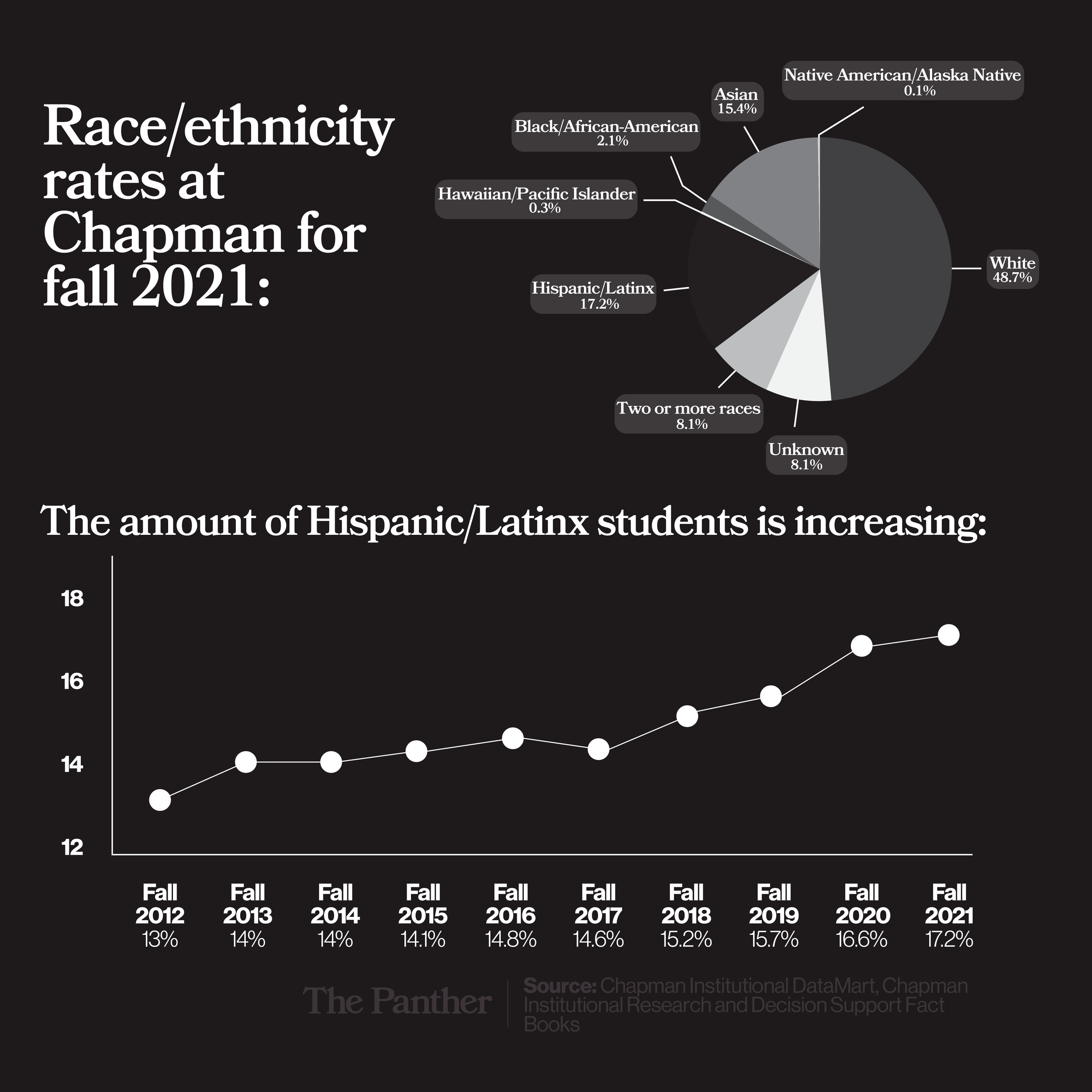Chapman looks to increase Latinx student population to at least 25%
President Daniele Struppa announced the university’s plan to work towards its goal in becoming a Hispanic Serving Institution during this year’s State of the University Address. Graphic by SUKHMAN SAHOTA, art director
Chapman University President Daniele Struppa announced the university’s plan to become a Hispanic Serving Institution (HSI) during the annual State of the University Address earlier this year. The White House gives this designation to higher-education institutions that consist of at least 25% Hispanic students who are enrolled full-time.
“Chapman is on its way to become a Hispanic Serving Institution, which I think would be a very important thing for us to do because I think there is a lot of talent that we can really draw from that pool that is not yet interested or is not looking at Chapman as an institution of choice,” Struppa said during the address while comparing the ethnic backgrounds of undergraduate and graduate students in fall 2016 and fall 2021, noting an increase in the Hispanic and Latinx population.
According to Chapman’s fall 2020 information guide, in the 2019-20 school year, 16% of undergraduate degree recipients were Hispanic or Latinx, 19% of master degree recipients were Hispanic or Latinx and 14% of doctoral degree recipients were Hispanic or Latinx.
Chapman’s Office of Diversity, Equity, and Inclusion (DEI) has worked with Struppa to meet Chapman’s goal of becoming a Hispanic Serving Institution.
“Right now we are at about 18% Latinx/Hispanic student body here at Chapman,” said Gabriela Castañeda, the director of Latinx Achievement. “With the growth of the Latinx community or population across the country, it makes sense for Chapman to become a Hispanic Serving Institution. Many of our local institutions are already HSI.”
Other four-year institutions in Orange County are HSIs, including the University of California, Irvine and California State University, Fullerton.
Castañeda explained that receiving the HSI designation will be a beneficial, yet lengthy undertaking for Chapman.
“The goal is to get to HSI, but there are a lot of steps to getting there,” Castañeda said. “Recruitment of students is obviously one, the process of admissions and all of that, the process to get them to campus and also supporting the students when they are here, in addition to continuing to cultivate the relationships with them once they graduate from Chapman.”
In addition to seeking out new Latinx students, the DEI office supports Latinx students who are currently enrolled at Chapman.
“We approach it in different ways,” Castañeda said. “One is creating a culture that is reflective of the community. And advocacy that needs to be done with what the students need, what the needs are in order for them to be successful.”
Arleth Ulloa, a senior political science and English double major who currently serves as the president of the Chapman Latinx club, told The Panther she would be thrilled if Chapman received the HSI designation.
“I would feel really proud of my community if Chapman were Hispanic serving because I know that the Latinx population would really take advantage of any and all new and/or improved resources that may come along with that title,” Ulloa told the Panther.
Chapman Latinx, which holds weekly meetings for members to attend, cultivates a connected Latinx community and teaches students about the culture through activities like fundraisers, holiday celebrations, outings and networking events.
“Considering we are the only club on campus that is specifically for Latinx students, it’s really easy to gain popularity and consistency amongst our members because they feel welcomed and wanted at our events,” Ulloa said.
Chapman’s faculty has worked with Latinx students to uplift their community. This year, Chapman Latinx worked with the DEI office to organize events for Latinx History Month.
“Funding student-led events has shown to cultivate our best events,” Ulloa said. “Also, supporting us with spaces and rooms when needed has always been beneficial to us. I think the club has made a lot of strong connections already with faculty and staff, so when we need help, we know where to go and that has made a world's difference.”

